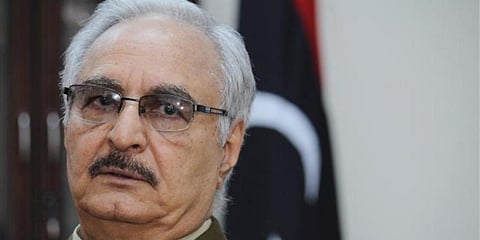

CAIRO: Libya’s powerful commander, Khalifa Haftar, filed Tuesday as a candidate in the country’s presidential elections next month, as the long-waited vote faces growing uncertainty.
Haftar submitted his candidacy papers Tuesday in the eastern city of Benghazi and announced the move in a video. He said he's seeking the country's highest post to “lead our people in a fateful stage.”
Libya has been wracked by chaos since a NATO-backed uprising toppled longtime dictator Moammar Gadhafi in 2011. The oil-rich nation had for years been split between a government in the east, backed by Haftar, and a U.N.-supported administration in Tripoli, aided by west-based Libyan militias. Each side has also had the support of mercenaries from countries such as Russia and Syria and different regional powers.
Haftar commands the self-styled Libyan Arab Armed Forces but delegated his military duties in September to his chief of staff, Abdel-Razek al-Nadhouri, for three months, to meet candidacy terms.
Haftar’s announcement comes after Seif al-Islam Gadhafi, the son and one-time heir apparent of the late dictator, submitted candidacy papers Sunday in the southern town of Sabha. Seif al-Islam, who is wanted by the International Criminal Court on charges of crimes against humanity, has spent years largely in hiding.
If accepted, both Haftar and Seif al-Islam would be among front-runners in the Dec. 24 vote. They have stirred controversy in western Libya and the capital of Tripoli, the stronghold of their opponents, mostly Islamists.
Politicians and militia leaders have already expressed their rejection to their candidacies, and demanded laws governing the presidential and parliamentary elections to be amended.
The long-awaited vote still faces other challenges, including occasional infighting among armed groups, and the deep rift that remains between the country’s east and west, split for years by the war, and the presence of thousands of foreign fighters and troops.
Haftar’s forces besieged Tripoli in a year-long campaign that tried to capture the city. The campaign ultimately failed last year, leading to U.N.-mediated talks and the formation of a transitional government charged with leading Libya until the parliamentary and presidential elections.
In his video comments, Haftar said that if elected, he would prioritize defending Libya's “integrity and sovereignty.”
He has previously modeled his leadership on Egyptian President Abdel-Fattah el-Sissi, a close ally. Both have declared war on terrorism — applying the term not only to extremist groups but also more moderate Islamists.
The 77-year-old served as a senior officer under Gadhafi but defected in the 1980s during the ruinous war with Chad, in which he and hundreds of soldiers were captured in an ambush. Haftar later spent more than two decades in Washington, where he is widely believed to have worked with the CIA, before returning to join the anti-Gadhafi uprising in 2011.
Haftar’s prominence rose as his forces battled extremists and other rival factions across eastern and later southern Libya, areas now under his control. He has the support of Egypt and the United Arab Emirates, as well as France and Russia.